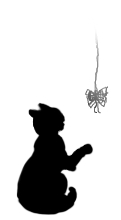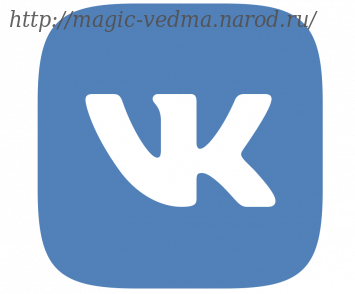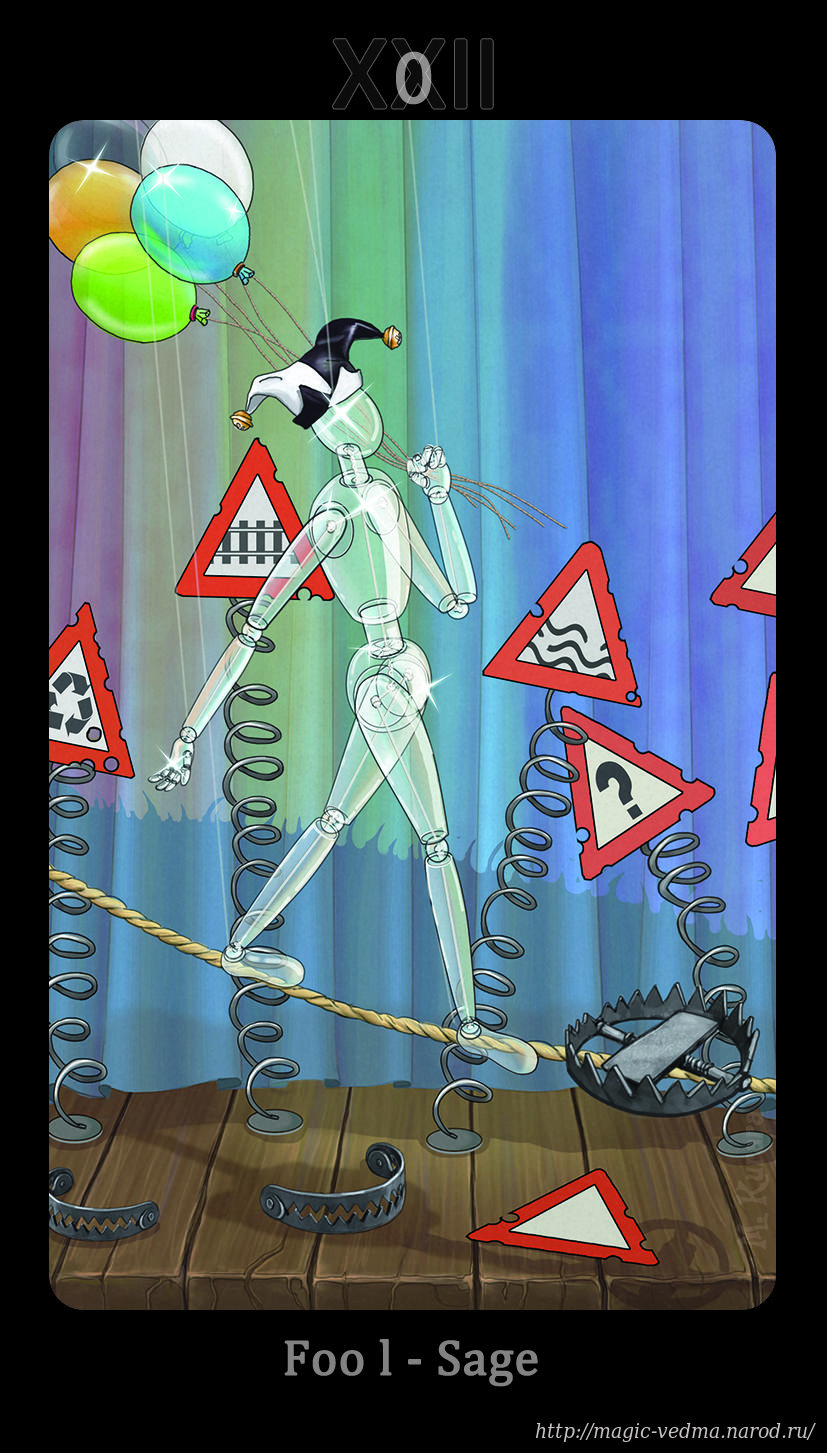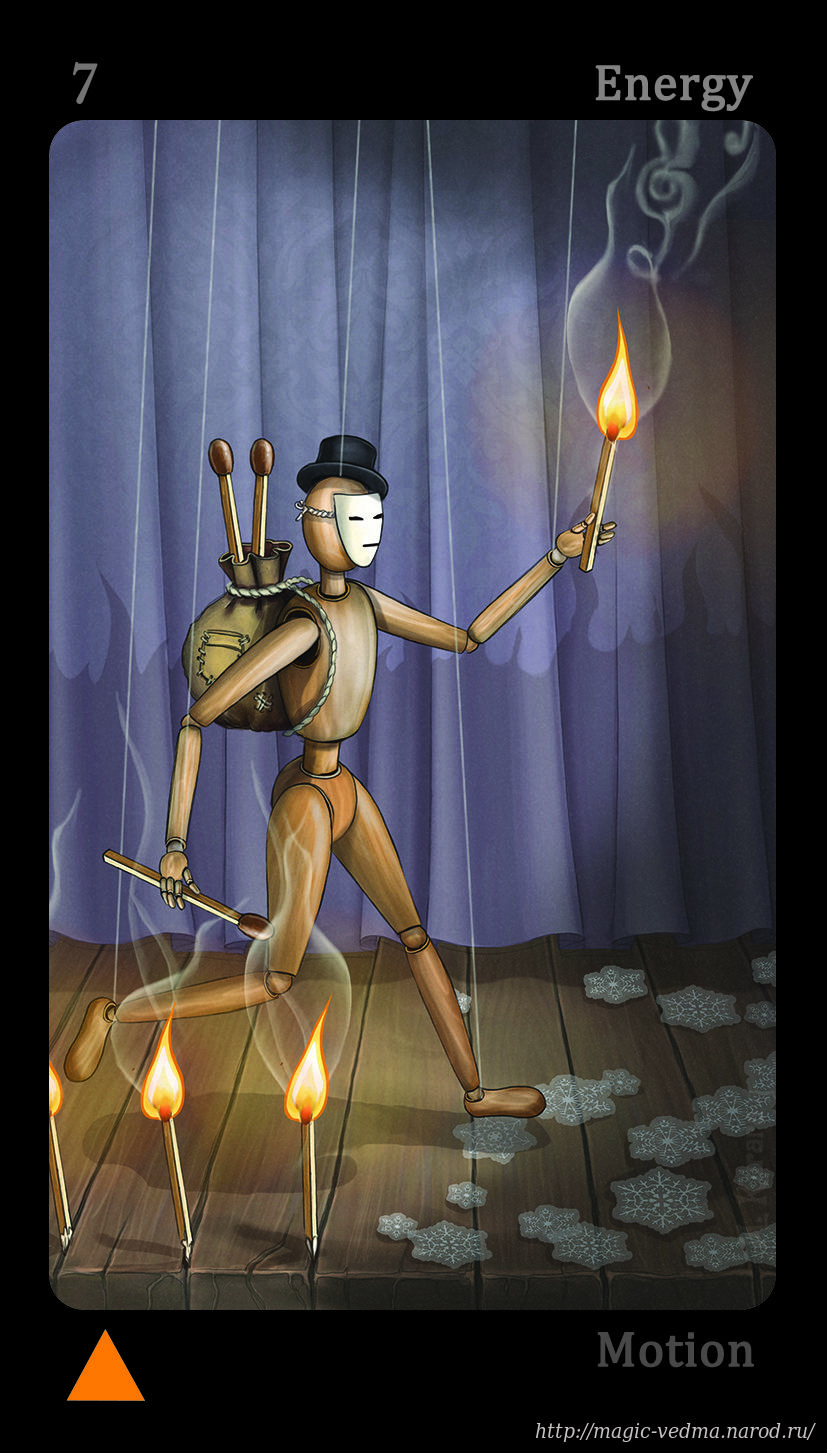|
*Now the book for this deck in English can be downloaded linc: Tarot deck "The Puppet Theater" is a unique author's development of the artist and tarologist Maria Kurara. The deck is created in the best traditions of Tarot, it has a unique plot, a big amount of symbols, logically built structure representing the system of images of the classic Tarot deck. Each card is carefully drawn and shows a theatrical scene from the life of the deck characters, where wooden ball-jointed puppets loved by many ones perform as actors. It is like we are watching a real-life drama. This deck reveals the symbolism of Tarot raising it to the surface from the depths of usual for everyone system of classical images and words. The goal is to let an experienced tarologist be able to operate directly the usual hidden concepts of Arcana, and to let a beginner understand how it all works so he or she was able to use this knowledge with other Tarot decks. Images of ball-jointed puppets create convenient anthropomorphic silhouettes, without a certain face or body structure that removes certain boundaries. A puppet on strings perfectly shows all the theatricality of life. After all, the Creator and his "creations" are very similar to the theater of actors and hiding behind the scenes Director. This deck is close in structure to the most of classic Tarot decks and contains 22 Major Arcana (0-21) and 56 Minor Arcana (numerical, distributed by suits). Also in the deck there are two "conditionally" empty cards, which can be included into the work with the cards by desire or only one of the two cards can be taken. Arcanum "Power" goes under number 11 (XI). "After creation of Black cats Tarot deck I as an author wanted to correct defects, to fill in gaps in structure of all habitual decks and to make such Tarot which will illuminate dark corners and will explain unclear moments. But I did not create anything new, just only showed the opposite side of any Tarot deck, its hidden edges, mechanism and its work. Of course, this is only one version, but it suddenly lined up logically in a good and clear structure. After all, people often reluctantly go into details and have not a very bid desire to see how everything works, it is the way for very curious and inquisitive minds. And this deck is the result of such interest, the study and analysis of knowledge which I and others have accumulated; it is definitely not all knowledge of the world, but some of it. Of course similar decks already exist, there may be even some extremely close in the meaning, I have not seen all the decks in the world. I hope very much that this structure will take roots, and new interesting decks will be created on its basis. This version of the deck is slightly different from the author's version, time has passed, and some things have been rethought and corrected in this version."
In spite of the similarity to the classic Tarot deck, there are also differences that make The Puppet Theater deck unusual and at the same time attractive for study.
The first difference is in the change of the familiar names of the junior court persons. Court cards themselves are a kind of third part of the structure with its characteristics and balance. In ancient patriarchal times, the presence of Pages and Knights in Tarot was more natural than now. In such a structure the balance of male and female principles gets completely lost. However, in the Tarot as a reflection of the world everything must be balanced, although the world lost its harmony long ago. Of course Page as it is must not necessarily be a female; it is only an unformed personality looking for itself, that is why it is possible to call it both a male and a female name. The very concept of page does not have a clear gender identity, but in the old days pages were boys as a rule. Because of it the association in people's minds comes to a male element that makes confuse.
Another important thing is elements to which each of the four persons belongs. The King belongs to the fire (the male element), the Queen belongs to the water (female element), Knight belongs to the air (male element). In three elements there is full order, except for the Page which occupies a niche associated with matter and everything that one can touch or see. And this element embodies the female principle with a soft passive accent. A female image would be more appropriate in this role. The reason for the changes was the logic. When Prince in its development aspires to be King, and Princess wants to become Queen in the future, in this case the Junior court cards have the future, and the development becomes clear. But it does not happen in a familiar scheme with a page and a knight. What are the chances of a page (in fact a servant) to become a king or a knight? And a queen? She has after all no period of development reflected in cards. And girls are not born queens, they develop themselves to this condition and status. According to such logic persons be can easily divided into pairs. Female: a girl - a woman (Princess — Queen), and male: a boy — a man (Prince — King). In Tarot there is development everywhere, otherwise it would be a completely dead structure, and it is alive, thus it is necessary to help it to come to a balance with the help of a straight internal logic. That is why in this deck Page turned into Princess, and Knight became Prince. |
|
outline: Blue — the special title (a single lane) Red — the header of the first level Green — the header of the second level Grey — link to the card
Description of the deck The description of the Tarot structure The Major and Minor Arcana Numerology in Tarot Symbols in the deck Artistic symbols Recommendations for working with the deck Possible options for the interpretation of the Arcana Major Arcana 0 (XXII). The Fool/The Sage 1 (I). Magic 2 (II). Contemplation 3 (III). Creativity 4 (IV). Control 5 (V). Faith 6 (VI). Attraction 7 (VII). Following 8 (VIII). Balance 9 (IX). Reclusion 10 (X). Choice 11 (XI). Power 12 (XII). Suspension 13 (XIII). Dying 14 (XIV). Abstinence 15 (XV). Obsession 16 (XVI). Destruction 17 (XVII). Hope 18 (XVIII). Immersion 19 (XIX). Awareness 20 (XX). Boomerang 21 (XXI). Accomplishment |
Minor Arcana and their possible interpretations
Mind (Needles) 1 of Mind. Breakthrough 2 of Mind. Game 3 of Mind. Collision 4 of Mind. Solution 5 of Mind. Stress 6 of Mind. Search 7 of Mind. Ideas 8 of Mind. Ways 9 of Mind. Introspection 10 of Mind. Collapse The Princess of Mind. Curiosity The Prince of Mind. Perseverance The Queen of Mind. Insight The King of Mind. Genius
Energy (Matches) 1 of Energy. Origin 2 of Energy. Strengthening 3 of Energy. Communication 4 of Energy. Preservation 5 of Energy. Awakening 6 of Energy. Recovery 7 of Energy. Motion 8 of Energy. Fixation 9 of Energy. Management 10 of Energy. Renewal The Princess Of Energy. Playfulness The Prince of Energy. Aspiration The Queen of Energy. Cheerfulness The King of Energy. Activity
Emotions (Bowls) 1 of Emotions. Source 2 of Emotions. Exchange 3 of Emotions. Saturation 4 of Emotions. Boredom 5 of Emotions. Splash 6 of Emotions. Absence 7 of Emotions. Interest 8 of Emotions. Novelty 9 of Emotions. Joy 10 of Emotions. Rest The Princess of Emotions. Openness The Prince of Emotion. Ease The Queen of Emotions. Softness The King of Emotion. Hospitality
Matter (Pentacles) 1 of Matter. Manifestation 2 of Matter. Multiplication 3 of Matter. Expectation 4 of Matter. Fruitage 5 of Matter. Fading 6 of Matter. Strengthening 7 of Matter. Revival 8 of Matter. Result 9 of Matter. Abundance 10 of the Matter. Cyclicity The Princess of Matter. Effort The Prince of Matter. Constancy The Queen of Matter. Carefulness The King of Matter. Industriousness
The Layout "Elements" |






 Features of the deck
Features of the deck

